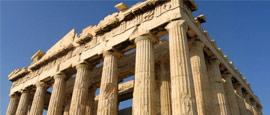The show-stopping Acropolis (upper city) dominates both the city's skyline and any tourist's itinerary. Athens’ original settlement was founded on this rocky outcrop and it has seen modifications through the millennia. The site includes four sacred buildings, all from the Golden Age of Pericles (461-429BCE). The steep ascent to the summit leads to the Propylaea, a monumental entrance to the site in Ionic and Doric styles. The Temple of Athena Nike is to the left of the Propylaea; the original was demolished in 480 BCE by the Persians and a new temple was built over the remains. It was damaged again by Turkish forces in the 17th century but was beautifully restored after the independence of Greece in 1834. The Parthenon is the largest building on the Acropolis and an icon of Western civilisation. Built entirely from marble, it was intended as a sanctuary for the goddess Athena and housed a massive statue of her, long since lost to history. Despite the tourists, the perfect harmony of the structure is still awe-inspiring. The Erechtheion temple is a dual shrine to Athena and Poseidon-Erechtheus and was built on the site of the mythical battle between the two deities. The south side features a series of six support columns designed as maidens or caryatids.
Things to see in Athens
Tourist offices
Address: Dionysiou Areopagitou 18-20, Athens, Attica, Greece
Tel: +30 21 0331 0392.
Opening Hours:
Mon-Fri 0900-2000, Sat 1000-1600.
www.visitgreece.grWith a wealth of leaflets and plenty of local knowledge, the GNTO office can help you book everything from excursions to hotel rooms.
Now a jumble of monuments and ruins, in Athens' heyday, the Agora was the focus of city life, serving as a place of trade and as the city's political, administrative and cultural heart. Law courts, temples and public offices were all based in this area, where ordinary Athenians, stallholders and merchants mingled with officials, politicians and philosophers. Today, the site is dominated by the 5th-century BCE Hephaisteion (Temple of Haephaistos), one of Greece’s best-preserved ancient temples. The fascinating Museum of the Ancient Agora) contains an eccentric array of everyday artefacts found in the area. It is housed in the second-century BCE Stoa Attalou (Stoa of Attalos), which is thought to have been an early shopping arcade containing 42 separate shops.
Housed in a late 19th-century building, the vast Archaeological Museum is undoubtedly the best museum in the country with one of the finest collections of ancient and classical Greek artefacts in the world. Fascinating pieces include the Mycenaean Art Collection, featuring hordes of finely crafted gold work dating from between the 16th and 11th centuries BCE, and the Bronze Collection, including an imposing statue of Poseidon or Zeus (no one is sure which) from 460BCE.
This impressive ultra-modern glass-and-concrete structure showcases priceless ancient statues and artefacts from the Acropolis site. The star exhibit is the marble frieze that once ran around the top of the Parthenon – although almost half the pieces are in London. Greeks hope it will persuade the British Museum in London to return those pieces - the controversial Parthenon Marbles, seized by Lord Elgin in 1799.
Dedicated to Zeus, this was one of largest temples in the ancient world. Building work began in 6th century BCE, but was only completed around 640 years later in 2nd century CE under the Roman Emperor Hadrian. An earthquake damaged it during the medieval period, and much of the stone was subsequently carried away for use on other buildings. Today, 16 of the original 104 marble columns survive.
The museum houses the vast private collection of Antonis Benakis, the son of a wealthy Greek from Alexandria, Egypt. Displayed in a neo-classical mansion, the collection traces the development of Greek art, from the Stone Age up to the 20th century, with jewellery, ceramics, paintings, sculptures, furniture and costumes laid out diachronically. Highlights include the Thessaly Treasure (a stash of second century BCE gold jewellery) and two of El Greco’s early religious-themed oil paintings.
The museum houses the spectacular private collection of Nicholas P Goulandris. Beautiful exhibits from the Cycladic civilisation (3,000-2,000BCE) form the focus of the collection. They include marble female figurines, thought to have been fertility symbols, which were inspirations for artists like Picasso and Modigliani, and decorated clay vases, placed in graves as votive offerings. Other artefacts span the pre-Minoan Bronze Age and the post-Mycenaen age up to 700BCE.
This elegant white marble stadium was rebuilt for the first of the modern-day Olympic Games in 1896. It is a reconstruction of the ruins of a 6th-century BCE stadium that originally stood on the same site, and which was also used by the Romans. It should not be confused with the modern Olympic Stadium in the north of the city at Maroussi that formed the centre stage of the 2004 Olympics, though it was used for archery and the finish line of the Marathon.
On the southern slopes of the Acropolis Hill, the Theatre of Dionysus was home to the original performances of the tragedies of Aeschylus, Sophocles and Euripedes and the comedies of Aristophanes. This stone auditorium, from the 4th century BCE, held 17,000 spectators and the ruins remain one of the most atmospheric of Athens' ancient sites.
Housed in a delightful neoclassical villa, this modern museum exhibition space chronologically traces the development of Byzantium up until the empire’s fall in 1453. Besides boasting one of the richest collections of religious icons in the world, it exhibits mosaics, frescoes, sculptural works and jewellery from Greece and other regions of the former Byzantine Empire.
Do you have any Feedback about this page?
© 2026 Columbus Travel Media Ltd. All rights reserved. No part of this site may be reproduced without our written permission, click here for information on Columbus Content Solutions.








 You know where
You know where